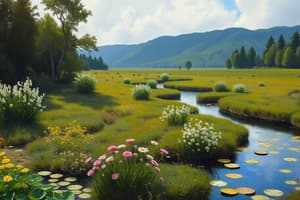Podcast
Questions and Answers
What is the gradual process of change in an ecosystem over time?
What is the gradual process of change in an ecosystem over time?
Ecological Succession
What kind of succession starts as bare rock?
What kind of succession starts as bare rock?
Primary succession
What kind of succession starts after a climax community undergoes a catastrophic change?
What kind of succession starts after a climax community undergoes a catastrophic change?
Secondary succession
What is a climax community?
What is a climax community?
Pond succession is a form of primary succession.
Pond succession is a form of primary succession.
What is the term for the plant or animal that is the first to move into a new or empty area to start an ecosystem?
What is the term for the plant or animal that is the first to move into a new or empty area to start an ecosystem?
What is a catastrophic change that can trigger secondary succession?
What is a catastrophic change that can trigger secondary succession?
What is left after a catastrophic event during secondary succession?
What is left after a catastrophic event during secondary succession?
What is the name for the weathering of the earth over a long period of time?
What is the name for the weathering of the earth over a long period of time?
Which of the following are examples of natural changes that can affect ecosystems?
Which of the following are examples of natural changes that can affect ecosystems?
Which of the following are examples of man-made changes that can affect ecosystems?
Which of the following are examples of man-made changes that can affect ecosystems?
What is the process water takes through the biotic and abiotic parts of the ecosystem?
What is the process water takes through the biotic and abiotic parts of the ecosystem?
What is the name for rain, snow, hail, or sleet?
What is the name for rain, snow, hail, or sleet?
What is the process where water leaves the surface of the earth to return back to the atmosphere?
What is the process where water leaves the surface of the earth to return back to the atmosphere?
What is the process where water vapor cools and turns back into a liquid, forming clouds, dew, or fog?
What is the process where water vapor cools and turns back into a liquid, forming clouds, dew, or fog?
What is the process where water from plants evaporates back into the atmosphere?
What is the process where water from plants evaporates back into the atmosphere?
What is the process plants do to turn carbon dioxide, water, and sunlight into glucose and oxygen?
What is the process plants do to turn carbon dioxide, water, and sunlight into glucose and oxygen?
What is the process that plants and animals do to turn glucose and oxygen into carbon dioxide, energy, and water?
What is the process that plants and animals do to turn glucose and oxygen into carbon dioxide, energy, and water?
What is the process that decomposers do to turn dead matter into nutrients in the soil?
What is the process that decomposers do to turn dead matter into nutrients in the soil?
What process do humans use to turn fossil fuels into energy, releasing carbon back into the atmosphere?
What process do humans use to turn fossil fuels into energy, releasing carbon back into the atmosphere?
What is the process nitrogen takes through the biotic and abiotic parts of the ecosystem?
What is the process nitrogen takes through the biotic and abiotic parts of the ecosystem?
Nitrogen gas (N2) is a usable form of nitrogen for living things.
Nitrogen gas (N2) is a usable form of nitrogen for living things.
What is the importance of nitrogen?
What is the importance of nitrogen?
What is the process of turning nitrogen from the atmosphere into ammonia in the soil?
What is the process of turning nitrogen from the atmosphere into ammonia in the soil?
What is the process of ammonia or nitrates being taken up by plants?
What is the process of ammonia or nitrates being taken up by plants?
What is the process of breaking down nitrogen from dead organisms into ammonia in the soil?
What is the process of breaking down nitrogen from dead organisms into ammonia in the soil?
What is the process of turning ammonia into nitrates, which are easier for plants to take up?
What is the process of turning ammonia into nitrates, which are easier for plants to take up?
What is the process that nitrates turn into nitrogen gas?
What is the process that nitrates turn into nitrogen gas?
What is an extreme increase of nutrients in the water, usually due to runoff, that causes the water to be drained of oxygen, killing all organisms that live there?
What is an extreme increase of nutrients in the water, usually due to runoff, that causes the water to be drained of oxygen, killing all organisms that live there?
Which of the following are examples of agricultural runoff that can contribute to eutrophication?
Which of the following are examples of agricultural runoff that can contribute to eutrophication?
What happens in the first step of eutrophication?
What happens in the first step of eutrophication?
What happens in the second step of eutrophication?
What happens in the second step of eutrophication?
What term describes a condition of little oxygen in the water?
What term describes a condition of little oxygen in the water?
What term describes a condition of no oxygen in the water?
What term describes a condition of no oxygen in the water?
What term describes areas where there are no longer any oxygen or extremely low levels of oxygen?
What term describes areas where there are no longer any oxygen or extremely low levels of oxygen?
What happens to carbon while composting?
What happens to carbon while composting?
What happens to nitrogen while composting?
What happens to nitrogen while composting?
What are the benefits of composting for the soil?
What are the benefits of composting for the soil?
What are the benefits of composting for climate change?
What are the benefits of composting for climate change?
What is climate change?
What is climate change?
Which of the following are effects of climate change?
Which of the following are effects of climate change?
Flashcards
Ecological Succession
Ecological Succession
The gradual process of change in an ecosystem over time.
Primary Succession
Primary Succession
Starts as bare rock and forms a complete ecosystem.
Secondary Succession
Secondary Succession
Starts after a climax community undergoes a catastrophic change (fire, hurricane, etc.). Soil remains.
Pond Succession
Pond Succession
Signup and view all the flashcards
Pioneer Species
Pioneer Species
Signup and view all the flashcards
Climax Community
Climax Community
Signup and view all the flashcards
Bare Rock
Bare Rock
Signup and view all the flashcards
Soil Remains
Soil Remains
Signup and view all the flashcards
Erosion
Erosion
Signup and view all the flashcards
Natural Changes
Natural Changes
Signup and view all the flashcards
Examples of Natural Changes
Examples of Natural Changes
Signup and view all the flashcards
Man-Made Changes
Man-Made Changes
Signup and view all the flashcards
Examples of Man-Made Changes
Examples of Man-Made Changes
Signup and view all the flashcards
Water Cycle
Water Cycle
Signup and view all the flashcards
Precipitation
Precipitation
Signup and view all the flashcards
Evaporation
Evaporation
Signup and view all the flashcards
Condensation
Condensation
Signup and view all the flashcards
Transpiration
Transpiration
Signup and view all the flashcards
Carbon Cycle
Carbon Cycle
Signup and view all the flashcards
Photosynthesis
Photosynthesis
Signup and view all the flashcards
Cellular Respiration
Cellular Respiration
Signup and view all the flashcards
Decomposition
Decomposition
Signup and view all the flashcards
Burning Fossil Fuels (Combustion)
Burning Fossil Fuels (Combustion)
Signup and view all the flashcards
Nitrogen Cycle
Nitrogen Cycle
Signup and view all the flashcards
Nitrogen Gas (N2)
Nitrogen Gas (N2)
Signup and view all the flashcards
Importance of Nitrogen
Importance of Nitrogen
Signup and view all the flashcards
Nitrogen
Nitrogen
Signup and view all the flashcards
Nitrogen Fixation
Nitrogen Fixation
Signup and view all the flashcards
Assimilation
Assimilation
Signup and view all the flashcards
Ammonification
Ammonification
Signup and view all the flashcards
Nitrification
Nitrification
Signup and view all the flashcards
Denitrification
Denitrification
Signup and view all the flashcards
Eutrophication
Eutrophication
Signup and view all the flashcards
Agricultural runoff
Agricultural runoff
Signup and view all the flashcards
First Step of Eutrophication
First Step of Eutrophication
Signup and view all the flashcards
Second step of Eutrophication
Second step of Eutrophication
Signup and view all the flashcards
Third Step of Eutrophication
Third Step of Eutrophication
Signup and view all the flashcards
Fourth Step of Eutrophication
Fourth Step of Eutrophication
Signup and view all the flashcards
Fifth Step of Eutrophication
Fifth Step of Eutrophication
Signup and view all the flashcards
Sixth Step of Eutrophication
Sixth Step of Eutrophication
Signup and view all the flashcards
Hypoxic
Hypoxic
Signup and view all the flashcards
Anoxic
Anoxic
Signup and view all the flashcards
Dead Zone
Dead Zone
Signup and view all the flashcards
What happens to CARBON while Composting
What happens to CARBON while Composting
Signup and view all the flashcards
What happens to NITROGEN while Composting
What happens to NITROGEN while Composting
Signup and view all the flashcards
Benefits of Composting for the Soil
Benefits of Composting for the Soil
Signup and view all the flashcards
Benefits of Composting for Climate Change
Benefits of Composting for Climate Change
Signup and view all the flashcards
Climate Change
Climate Change
Signup and view all the flashcards
Effects of Climate Change
Effects of Climate Change
Signup and view all the flashcards
Study Notes
Ecological Succession
- Gradual change in an ecosystem over time.
- Primary Succession: Begins on bare rock, forming a complete ecosystem.
- Secondary Succession: Starts after a catastrophic event (e.g., fire, hurricane), with existing soil.
- Pond Succession: A type of secondary succession, starting with soil.
- Pioneer Species: First organisms to colonize a new area.
- Climax Community: Final stage of succession, a fully developed ecosystem.
Ecosystem Changes & Cycles
- Natural Changes: Events like hurricanes, flooding, and volcanic eruptions.
- Man-Made Changes: Human activities such as land clearing, burning fossil fuels, and pollution.
Water Cycle
- Precipitation: Water falling as rain, snow, hail, or sleet.
- Evaporation: Water turning into vapor.
- Condensation: Vapor cooling to liquid, forming clouds.
- Transpiration: Water evaporating from plants.
Carbon Cycle
- Photosynthesis: Plants use carbon dioxide, water, and sunlight to create glucose and oxygen.
- Cellular Respiration: Plants and animals use glucose and oxygen to produce energy, releasing carbon dioxide.
- Decomposition: Decomposers break down dead matter, releasing carbon dioxide.
- Burning Fossil Fuels: Human activity releasing stored carbon into the atmosphere.
Nitrogen Cycle
- Nitrogen Gas (N2): Not usable by most organisms.
- Nitrogen Fixation: Converting atmospheric nitrogen into ammonia.
- Ammonification: Breaking down dead organisms into ammonia.
- Nitrification: Converting ammonia into nitrates.
- Assimilation: Plants absorbing nitrates.
- Denitrification: Converting nitrates back into nitrogen gas.
- Importance of Nitrogen: Essential for creating DNA, RNA, and proteins.
Eutrophication
- Cause: Excess nutrients (fertilizer runoff) in water.
- Steps: Fertilizer application, transport to water bodies, excessive plant growth, shading and plant death, bacterial decomposition and oxygen depletion, hypoxic/anoxic conditions and dead zones.
- Agricultural Runoff: Fertilizer, pesticides, manure, livestock contribute to eutrophication.
Composting
- Carbon: Composting breaks down organic matter releasing CO2.
- Nitrogen: Composting can involve N2 fixation.
Benefits of Composting
- Improves soil quality by supplying vital nutrients.
- Reduces methane emissions from landfills.
Climate Change
- Long-term shifts in global temperature and weather patterns.
- Effects: Decreasing sea ice, rising sea levels, increased extreme weather, rising global temperatures, warmer oceans.
Studying That Suits You
Use AI to generate personalized quizzes and flashcards to suit your learning preferences.




